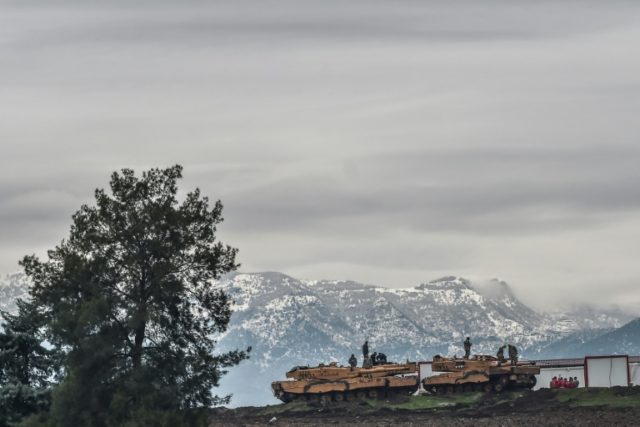An official within the Syrian Kurdish People’s Protection Units (YPG) told the Agence France-Presse (AFP) this week that the militia would welcome the presence of Syrian government soldiers in Afrin if they fought against the ongoing Turkish invasion of that region.
The YPG is one of many militias and factions fighting in Syria. It has mostly dedicated itself to protecting Syrian Kurdistan, also known as Rojava, from the Islamic State, but it has also fought ISIS in Arab areas, like former caliphate “capital” Raqqa. The YPG has largely avoided interacting with the army of Syrian dictator Bashar al-Assad, which has focused on eradicating anti-Assad Arab militias like the Free Syrian Army (FSA).
The YPG is allied with the United States and Russia, though both nations have largely avoided defending the militia against NATO member Turkey.
Turkish President Recep Tayyip Erdogan launched an invasion of northern Afrin, within Rojava, last month, threatening to expand Turkey’s presence in the country west to Manbij, where some U.S. soldiers are stationed, and down to Idlib, perilously close to Assad-controlled territory.
General Staff for the YPG Sipan Hemo reportedly told the AFP that the militia would pose no opposition to an Assad military presence in Afrin that would help defeat the Turkish invasion. “If the Syrian army wants to enter Afrin and help the YPG fighters in the war, we will not pose any obstacles for it to enter the city,” Hemo reportedly said, according to the Kurdish outlet Bas News.
Hemo reportedly went further, suggesting that if Assad does not believe in a sovereign Kurdistan, then his soldiers have a responsibility to protect Afrin from the Turkish military.
On February 5, another member of the Syrian Kurdish coalition stated that the Democratic Union Party (PYD), the political entity allied with the YPG, had sought Assad’s help in fighting off the Turkish military.
“We tried to convince them [Assad troops], via the Russians, to at least protect the borders, to take a position,” Kurdish politician Aldar Khalil said. “If they don’t protect the borders, then at least they don’t have the right to block the way for Syrian patriots who are protecting these borders, regardless of other domestic issues.”
Hemo’s comments also follow the publication of a report suggesting that Assad has already begun to secretly aid the YPG. Reuters, citing a spokesman for the Syrian Democratic Forces (SDF), claimed that Assad has begun to send aid to the Kurds in the nation’s northwest. The SDF is an umbrella organization supported by the United States and largely composed of YPG members.
“The Syrian regime is helping the Kurds with humanitarian support and some logistics, like turning a blind eye and allowing Kurdish support to reach some fronts,” an unnamed source told Reuters.
Hemo rejected this report, stating that the Kurds had received no humanitarian or other aid from Assad.
Reports shortly after the launch of “Operation Olive Branch,” Turkey’s name for its invasion of Afrin, suggested that Assad and his Russian patrons offered the YPG support in exchange for granting Assad control of their territory. Sinem Mohamed, the U.S. representative of the Democratic Federation of Northern Syria Representative (DFNS), claimed that the Kurds rejected handing over any part of Rojava.
As the YPG has largely focused on fighting the Islamic State, it has made allies with multiple actors in the Syrian civil war that are typically at odds. The YPG has long maintained U.S. support, even suggesting a year ago that the Trump administration would provide more support than its predecessor. “There are signs of full support from the new American leadership—more than before—for our forces,” spokesman Talal Silo said at the time (Silo since disappeared and resurfaced in Turkey, accusing the YPG of allowing ISIS terrorists to escape Raqqa).
Following the liberation of Raqqa, the YPG lost much of its American support. It also lost Russian support, as Russia primarily supports Assad, and any militia threatening Assad’s supremacy over any part of Syria is an enemy. The YPG support the establishment of an independent Kurdistan.
Yet, in Turkey, Assad and the Kurds have found a common rival. The Turkish government considers the YPG indistinguishable from the Kurdistan Workers’ Party (PKK), a U.S.-designated terrorist group. Its invasion of Afrin is intended in part to prevent the creation of a sovereign Kurdish state out of Turkish land.
When Erdogan first announced a Turkish presence in Syria in November 2016, however, he made clear his primary goal in the country was not to fight the Kurds.
“Why did we enter? We do not have an eye on Syrian soil. The issue is to provide lands to their real owners. That is to say we are there for the establishment of justice,” Erdogan said. “We entered there to end the rule of the tyrant al-Assad who terrorizes with state terror.”
Although Turkey is a NATO ally of America’s and Washington has categorically called for Assad to step aside, a Turkish presence in Syria also threatens American troops. Erdogan has asserted that he would order troops into Manbij, home to a sizeable American military presence. He was warned Americans to vacate the area.
U.S. Secretary of State is currently in Ankara meeting with high-level Turkish officials to diffuse tension in northern Syria.

COMMENTS
Please let us know if you're having issues with commenting.